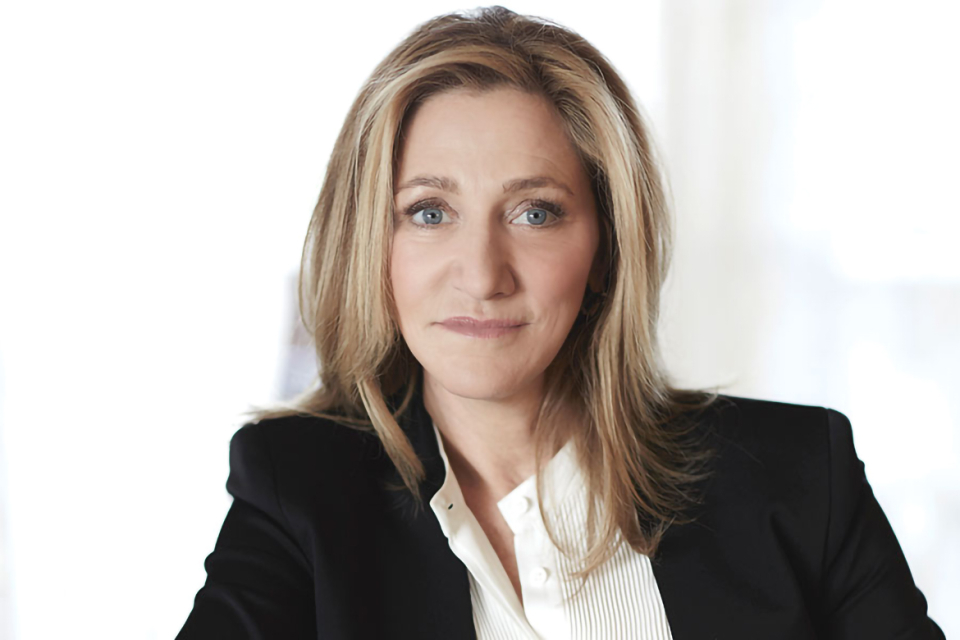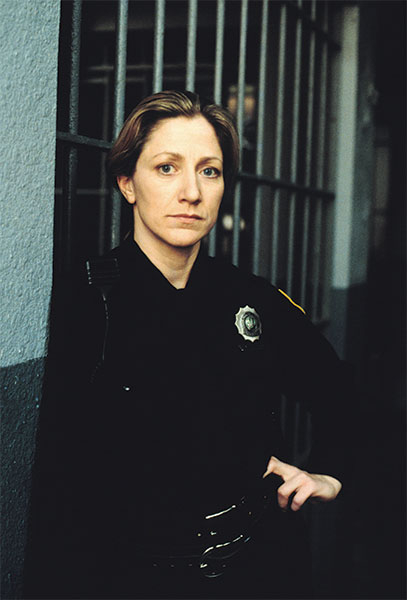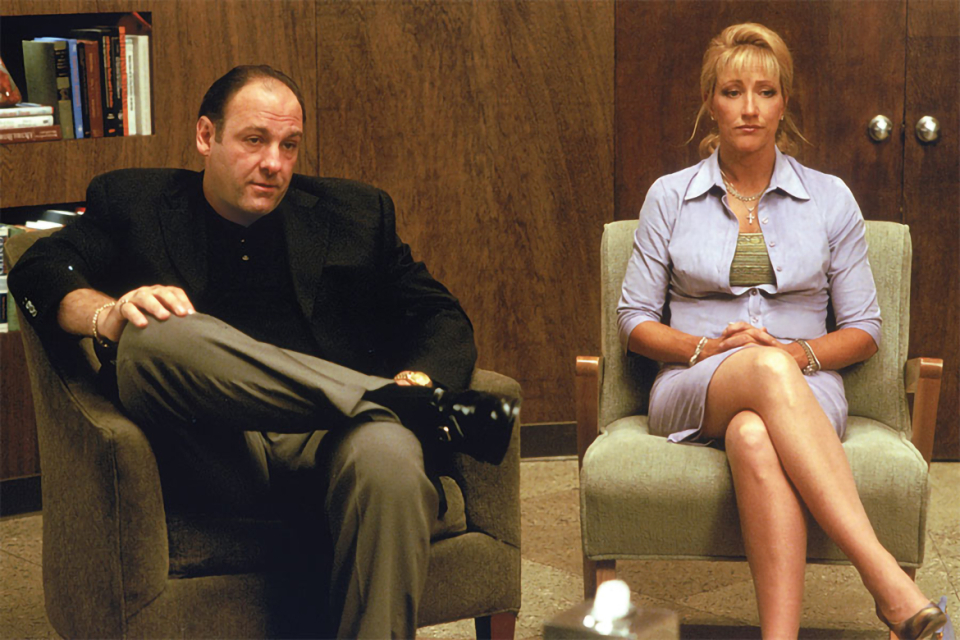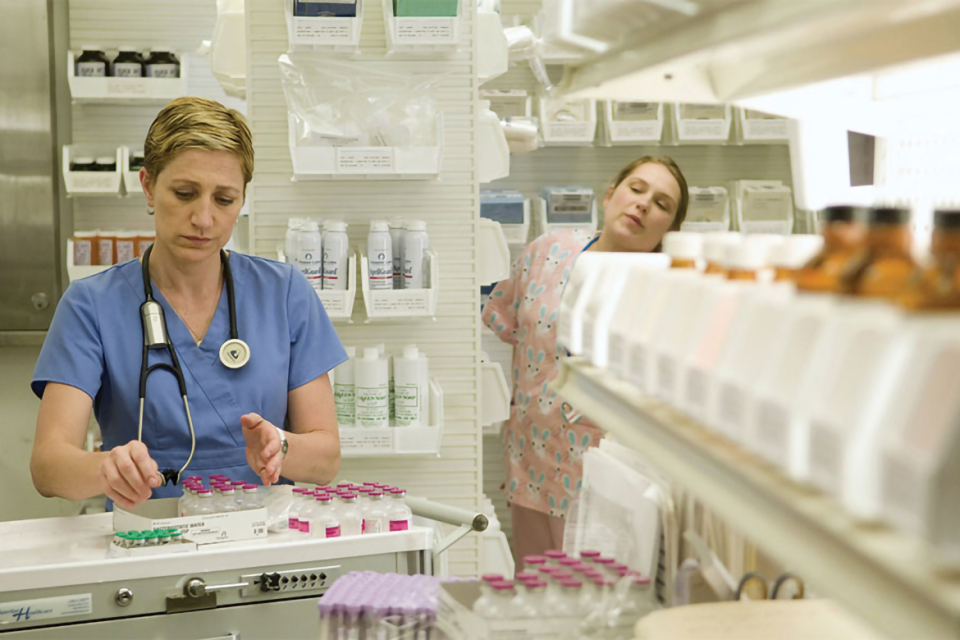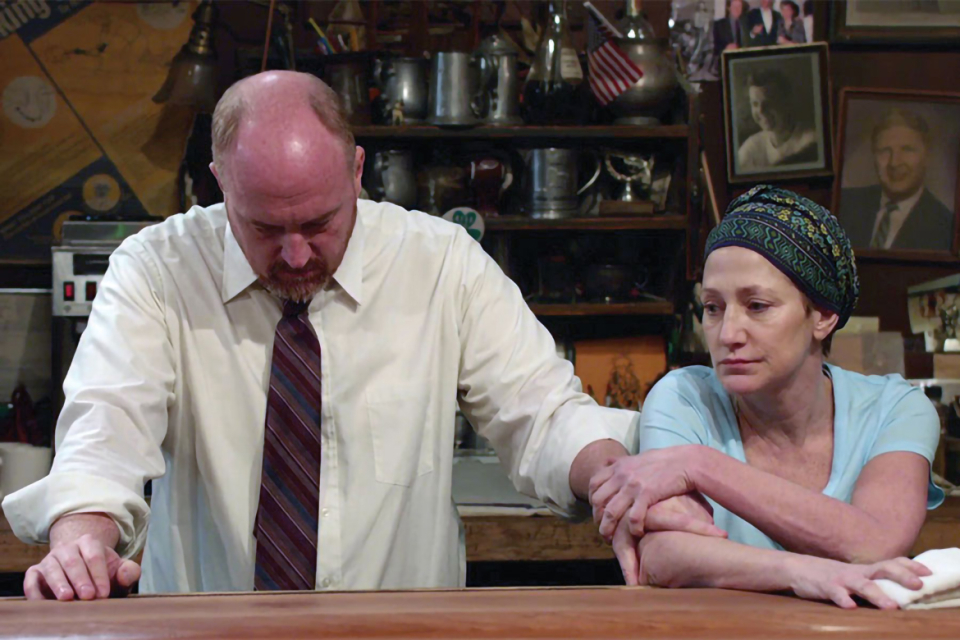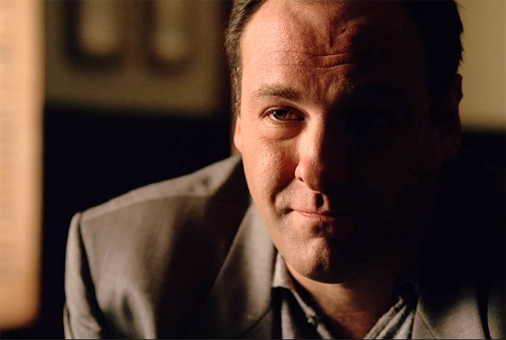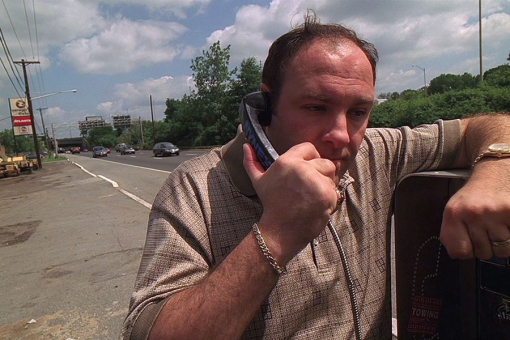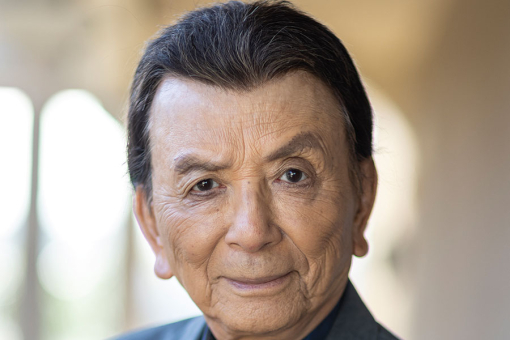As a child, Edith Falco could often be found in the family’s backyard on Long Island, New York, skittering across a stage her mother had built with lumber from a nearby construction site.
Both of her parents were frustrated performers — her father was a jazz drummer who worked as a graphic designer, and her mother was an actress who performed with the local repertory theater while raising four kids.
Young Edie suffered from acute shyness, which she once described as “trying to breathe with plastic wrap around your face.” Still, she blossomed in the embrace of her bohemian family and was especially inspired by her mother’s love of acting.
As a senior in high school, she played Eliza Doolittle in the school’s production of My Fair Lady, and on the advice of a teacher, she pursued drama. At the State University of New York at Purchase, her classmates included Wesley Snipes, Parker Posey and Stanley Tucci.
While success was not immediate — Falco waited tables for 15 years after college while taking bit parts in theater and indie films — her fortunes turned in 1992. Producer-director Tom Fontana spotted her in a small film and cast her in his HBO series, Homicide: Life on the Street. From there she went on to his HBO prison drama, Oz.
It was the start of a career that would see the actress take on iconic roles as a mob kingpin’s wife in HBO’s The Sopranos and a drug-addicted nurse in Showtime’s Nurse Jackie. Falco was interviewed in 2016 by Adrienne Faillace, producer for The Interviews: An Oral History Project of the Television Academy Foundation. Following is an edited excerpt of that conversation.
Q: Did you ever think of moving to Los Angeles to further your career?
A: No. I’m a New Yorker. I live here. I was born here. I’m a real homebody. I can’t just pick up and move. It was never, even for a second, a possibility.
Q: Starting in 1993, you appeared on five episodes of Homicide: Life on the Street. How did that come about?
A: I was at college with Hal Hartley, a filmmaker. I did a bunch of his movies when I first got out of college. One of the people who worked on Hal’s movies was Nick Gomez, who is now a television director. Nick said, “I’m going to make a movie. Would you do this with me?” It was called Laws of Gravity.
It made the festival rounds, and Tom Fontana saw it. He decided that he liked me, and from that moment on he has been an angel, continually putting me in his stuff. Homicide was the first, and from there came Oz.
Q: Tell us about your time on Oz.
A: It was such a fun group of people to work with. Some of them were really funny, like Lee Tergesen [inmate Tobias Beecher]. And they all played these hard-core inmates — in a prison made of Styrofoam! It looked like cement, but you could put your finger right through it. They would yell, “Cut!” and people would do pirouettes and dance. It was so antithetical to the show.
I was thrilled to be working regularly with people I loved — and employed in this career that I struggled with for so many years.
Q: How did you get cast as Carmela Soprano?
A: I was working on Oz, and I got a call from my agent. They were doing a show called The Sopranos — I’d heard of it very peripherally and thought it was about singers. They said, “You have an audition.”
I read it and thought, “I know exactly who this woman is, and I know I’ll never get this part, because I know who gets cast in these Italian-American women roles and it’s not me.” There’s something about that idea of letting go that puts me in a far more open space when it comes to auditions.
Q: So what happened?
A: I did the audition. I did a scene that they had given me, and then [creator–executive producer] David Chase gave me another scene on the spot. I didn’t prepare for that scene, and I loved that. I trust that part of myself. The next day they called and said that I’d gotten it, which was unbelievable.
Since then, I’ve heard stories about how long they had been looking [for Carmela], how many people were very close to getting the role, how many times the show had been to other networks and who was going to play Tony originally [the role went to the late James Gandolfini]. Luckily, I didn’t know any of that at the time. I just knew I already had Oz, so I didn’t necessarily have to get this job to be okay.
Q: What were your first impressions of David Chase?
A: David reminds me so much of my dad. They are very similar, personality-wise. Italian- American guys, very smart — perhaps more than is good for them. Funny as hell. My father and I are very close, so I had a comfort level with David immediately. I don’t know that he had it with me. But I loved being around him.
Q: Can you describe the balance of comedy and drama on the show?
A: It’s the kind of show I love to do best. Some of it was some of the funniest stuff I’ve ever seen, but I would never say it was a comedy. It was all situational stuff that would come out of the story, and the actors were able to maneuver the balance. But a line was never said to be funny. It was said to be as real as it was supposed to be.
Q: How did you feel about the violence?
A: It’s a story about a violent lifestyle. You can talk about it, but unless you see it, I don’t know if you can really relate to the impact it has on the families and the people in that community. I think it was necessary. I have a hard time watching violence, but if it’s trying to make a point, I think there’s a place for it. It was an integral part of the story they were telling.
Q: What was it like working with James Gandolfini?
A: What can you say about James? I’ve met very few actors who were as exciting to work with. When you were acting with him, he was just Tony. Any actor I work with, I see the actor working on the character — it’s just part of what goes on. But Jim was never anything other than Tony, which made it very easy for me to be nothing other than Carmela.
So the experience of my marriage to him was as real of a relationship as I’ve had. It’s stored in a different part of my being, but the experience of being married to that man feels very dimensional and real inside me. It has everything to do with Jim’s ability to inhabit it.
He wasn’t a lifelong actor — he started very late. Whatever technique he had, he kept to himself. He was very organic, which I respond to.
Q: Were you close off screen?
A: We didn’t do a lot of socializing — I didn’t know him outside the realm of this character, which helped me keep it pretty pure, my marriage to this man. To this day, it’s one of the richest experiences I’ve had as an actor.
Q: How would you describe Tony and Carmela’s relationship?
A: Old. Their connection was historical. They’d known each other as teenagers and grown up together, so it was beyond being in love and all that. It’s the next thing that happens, I guess, in a marriage — you’re just partners. You’ve watched this other person undergo changes, and you’ve undergone changes in response. There’s a deep connection and loyalty, love mixed with all kinds of stuff.
Q: How were women portrayed on the show?
A: Women were very powerful, especially in the family dynamic. A lot of the men were afraid of the women, even in a world where guns were a normal part of a day’s equipment. I don’t think it was overdone or overstated. It was just the nature of that society, real or imagined.
Q: Were you recognized in public more frequently once the show was on?
A: One of the first times it happened, I was with my dad. Someone said, “Oh my God, you’re on that show!” That my father got to see someone say that to me — [it was like,] “Good, my father’s proud of me, now I move on to the next life goal.”
But a lot of times people would go, “Carmela, oh my God!” — and a lot of these women looked like Carmela.
I remember one group of women: “We’re having a pajama party — will you please come?” So I did, and they all had the nails and the hair. One woman came up to me — I was dressed as myself, in jeans, a T-shirt, a baseball cap — and she said, “Oh, I recognize you with your disguise.” I was like, “It’s not a disguise; it’s actually me.” I used to get that a lot, and I considered it a compliment that they felt that’s who I was.
Q: During the run of The Sopranos you were diagnosed with breast cancer.
A: Yeah.
Q: Is it true that you were diagnosed in the morning, and you went to work that afternoon and shot an intense scene about divorce?
A: Yeah, I was diagnosed in the morning, but I had to be at work at one o’clock, to shoot a scene in which Tony and Carmela were sitting at a table — I think it was after they had separated — and Tony said something like, “I’m going to take you for every cent you’re worth.”
I couldn’t remember my lines; it was a real out-of-body experience. I couldn’t process the news I had just gotten, and I hadn’t really told anyone but executive producer Ilene Landress, who is still a good friend.
It was a crazy day, but it was easier to get to some of the darker emotions. Jim came up to me and said, “Something’s going on.” I said, “Yes, it is.” He said, “What?” I said, “I’ll tell you in a little time.”
Q: Did you wind up telling him?
A: I did. He thought I was pregnant. It’s like, “No, that’s not it.” I think I may have told David at some point, but mostly so they could schedule around my chemo. I didn’t want anyone else to know. I’m not good with a lot of people going, “How are you doing?” I just went about my day. We were working very long, difficult hours; everyone was exhausted. I looked no worse than anybody else on the set.
Q: How long were you in treatment and balancing all of this?
A: I feel like the whole thing took a year. I could be wrong. Maybe eight months. They always used my real hair in the show, and then I had to talk to them about making wigs, so the hairdresser knew about it, too. They started getting me ready in my own little section of the trailers so I could have privacy.
But other than that, things just sort of chugged along. I dealt with this on my own, with my friends and my family, which is what worked for me.
Q: What were your thoughts when you read the script for the series finale?
A: I thought my script was missing some pages. But I also knew that it had meaning and significance that eluded me. I trusted David, and I know he had put a lot of thought into how it ended. Overall, I love it and I am so proud of it. I’m so grateful that David ended it the way he wanted, that he was brave enough to do it in a way that he knew wasn’t going to please everybody.
Some people wanted to see Tony riddled with bullets, some people wanted to see him kill others, and he did none of that. I may be making this up, but my memory is that David said something like, “All we know is that their life continues, and we’re no longer privy to it.” So many people would say to me, “Okay, I get it, but what actually happened?” We cut the cameras and we went home. That was really it.
Q: James Gandolfini died suddenly in June 2013. You did a very moving tribute to him on the Emmys that year.
A: That was particularly hard. His wife was in the audience. When he passed away, the emails I got were confusing and so deeply moving — the show had made people feel as if I was the person to contact when he died. That tribute was very important, but having his wife there and people who cared about the show was nerve-wracking.
They ended up changing what they gave me, because they had written something for me and I wanted it to be more accurate to my experience of him. I remember, at a certain point, just barely keeping it together. It was very hard. He was beloved by many.
Q: How did you get involved with your next big series, Nurse Jackie?
A: A good friend of mine from college said, “My next-door neighbor wrote a script he wants you to read” — which are some of the scariest words you can hear as an actor. But he said, “Just read it. I think it might be good.” It was called Nurse Mona, and it was the inception of what was to become Nurse Jackie .
It was very dark — not at all funny. The character was able to see people’s auras; she would take some item off each person as they died and keep it in a box. It was psychologically creepy and very dark. But I responded to the character. I liked her badass-ness and her not caring if people liked her. It was very refreshing.
Q: How did you proceed?
A: I went to L.A. and met with Liz Brixius and Linda Wallem, the showrunners and executive producers. They had punched it up to be more comedic, and it became Nurse Jackie.
Q: How would you describe your character, Jackie Peyton?
A: Jackie’s an addict, first and foremost. I think with most active addicts, that’s the first thing you can say about them. Everything else pales in comparison. She’s very high-functioning, very good at her job. Smart, but panicked about how to keep feeding her addictions and how to live when she’s trying to stop. She’s not calm, not particularly happy, but in the throes of addiction pretty much the whole time we know her.
Q: Did you base your portrayal on anyone in particular?
A: No. I’ve known many addicts in my life. I have a lot of good friends, family, et cetera, who are addicts, so I know the personality traits. I myself have struggled with addiction. Still do. It’s part of my personality. You learn to kind of harness it. But I don’t think she ever had the opportunities I have had to learn how to do that.
Q: Did you have any trepidation about being the series lead?
A: It’s what I wanted. On Sopranos there were days when I didn’t work. I wasn’t in every scene. They would say, “Oh my God, yesterday this funny thing happened. Jim was doing this thing…,” and I was like, “I was home.” Why was I home? I’m kind of an all-in gal.
So I said to my agents, “I want to be working every day. I want to be a part of the shape of the show — I want to watch it unfold. I want to watch these other actors that we all helped cast. I want to see them work.” That’s the way I work. That was a big part of why I took that job.
Q: In the season-five finale of Nurse Jackie, she takes a pill on the one-year anniversary of her sobriety. What did you think about that decision?
A: It was perfect. The behavior of addicts defies rationality. It’s usually about as upsetting as it can be. People who you’re sure are on the straight and narrow will suddenly take a turn at the most unpredictable times. This person cannot metabolize good news — it’s not what they’re used to. It doesn’t fit their ideas of what they deserve and who they are.
Her life was going well at that point; she had her anniversary and everybody was so proud of her. But she couldn’t hold on to all that. I was very proud of them for being strong and putting such an unpopular angle in the story.
Q: Let’s discuss the series finale.
A: When we were getting close to ending the series, they were bandying about every possibility: some very big, dramatic stuff and some very small stuff. I wanted Jackie to die — I thought it was important.
Throughout my time on the show, people would say, “It’s so nice to see a show about addicts…,” and then, “My brother was an addict. He overdosed a few years ago.” That’s more common than, “My sister’s finally clean after years.”
So I said, “I want it to be clear [to the audience] that this is not something that goes away. She’s not going to meetings. She’s not looking out for herself. It’s important to me that if that’s the way we’re going to go, I think she should die.” We don’t do that on television shows a lot.
Q: Did you get any pushback from the network?
A: It became a battle at the end. I think the network pushed back a little bit, saying things like, “We don’t think you can kill her. People care about this woman.” I said, “That’s the point. The unfairness, the largeness of the ramifications of rampant drug abuse.” We ended up with a compromise, where people aren’t sure that she died.
Q: In the Louis C.K. series Horace and Pete, you play Sylvia, the older sister of Horace, played by Louis. How did that come about?
A: At the Emmys a couple years ago, I met Louis. Later on, at a charity event, he came up to me and said, “I wrote a series. I want you to be in it. Can I send it to you?” I was like, “Yes.” He said, “Yes? So I can send….” And I said, “I’m in. I don’t need to read it.”
That’s how that happened. He asked me to be in this thing that he was doing and he said, “Steve Buscemi is in it,” and I was like, “Are you kidding me?” It was just another one of those things that fell in my lap
Q: What do you like about acting?
A: I love the atmosphere on a set. It’s one of the reasons I love television, because you get to know these people for a very long time if you’re lucky. It’s a family of sorts. You get to know them under weird circumstances, in a frozen parking lot in the middle of winter at five in the morning. It’s very intimate, in a bizarre way.
And then you create these pretend relationships. Some of the biggest emotions I’ve felt in my life were in the guise of a different person, since I was playing a role. But they still store themselves in my body, so I feel like I experienced that and, in fact, I did.
The circumstances were man-made — written by a writer — but being an emotional person, I get all the colors of the rainbow without having to go through the fallout from some of these situations — they have a beginning, a middle and an end.
The people I love most in the world are in this business. We’re all just a little bit off in some way; we’re all lacking a particular something. But they’re my peeps. I’m just the happiest camper alive, particularly when I’m working and when I’m working hard.
This article originally appeared in emmy magazine, Issue No. 5, 2017

